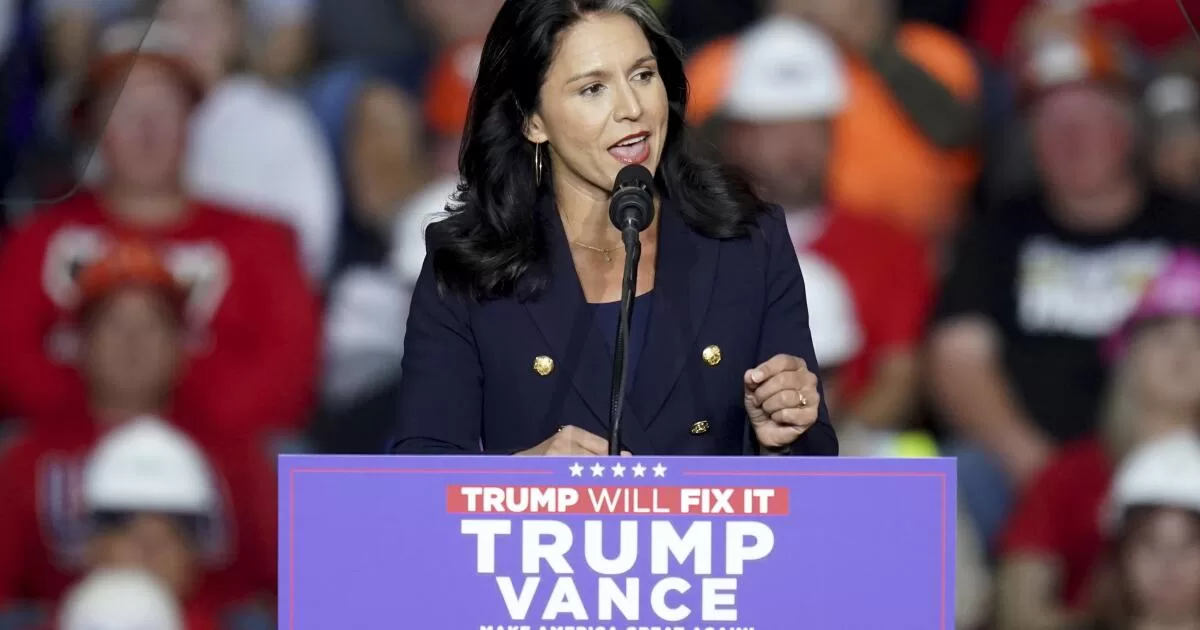WASHINGTON — Tulsi Gabbard, President-elect Donald Trump’s nominee to oversee the nation’s 18 intelligence agencies, is a woman of strong views, vigorously expressed.
A former Bernie Sanders Democrat, she now says the Democratic Party is controlled by “an elitist cabal of warmongers” that includes “rogue intelligence and law enforcement agents.” President Biden and Vice President Kamala Harris, she wrote recently, are merely puppets of that cabal.
A staunch anti-interventionist who opposes almost any use of U.S. military force, the former congresswoman from Hawaii blames Biden — not Vladimir Putin — for Russia’s invasion of Ukraine.
All of which echoes Trump’s views, especially his conviction that the FBI, CIA and other national security agencies have plotted ceaselessly against him.
On the other hand, during Trump’s first term in the White House, she also complained that he was too tough on Iran and denounced him for acting like “Saudi Arabia’s bitch.”
This year, though, she rallied to his side and endorsed him for promising to seek a thaw with Russia. She was a frequent, telegenic surrogate for his campaign on Fox News. No wonder Trump decided she was the perfect choice to guard the nation’s secrets as director of national intelligence.
National security veterans from both parties are not only unimpressed; they’re alarmed.
“We normally look for demonstrated competence in a nominee,” said Gregory F. Treverton, a former top intelligence official during the Obama administration who now teaches at USC. “This is a case of demonstrated incompetence. … She was obviously selected solely because she’s loyal to Trump.”
“I think she’s a serious threat to our national security,” John Bolton, who served as Trump’s national security advisor during his first term, said in a television interview. “Her judgment is nonexistent.”
Among Republicans in the Senate, Gabbard’s nomination elicited a few glowing endorsements — but an impressive list of noncommittal statements.
“That’s a nominee that illustrates the importance of a full background check,” said Susan Collins of Maine, one of the GOP senators who helped sink the nomination of former Rep. Matt Gaetz for attorney general last month.
Sen. James Lankford of Oklahoma said he “will have a lot of questions.” “It’s really important that we have leadership there that’s able to support” the intelligence agencies, he added.
Sen. John Cornyn of Texas, formerly the GOP’s second-ranking Senate leader, gave a speech praising most of Trump’s national security nominees by name — but left Gabbard conspicuously off the list. A Cornyn aide declined to say whether the omission was deliberate.
To Senate-watchers, the meaning of all that terseness was clear: If any of Trump’s nominees are in danger, Gabbard is at the top of the list.
Her long record as a foreign policy dissident under both Democratic and Republican presidents will give Senate hawks plenty to scrutinize — and, perhaps, to excoriate.
She not only blamed Biden for Russia’s war on Ukraine (she claims he failed to acknowledge Putin’s “legitimate security concerns” and demanded the United States cut off military aid to Kyiv. She also charged that the U.S. was funding dangerous biological laboratories in Ukraine — “parroting fake Russian propaganda,” Sen. Mitt Romney of Utah complained.
On the Syrian civil war, Gabbard opposed U.S. aid to the rebels fighting the brutal regime of Bashar Assad, met with the authoritarian leader and defended him against the allegations that he used chemical weapons on his own people. Assad, who is propped up by military aid from Iran and Russia, “is not the enemy of the United States,” she said.
She defended Edward Snowden and Julian Assange, who were indicted for masterminding two of the biggest leaks of intelligence secrets in U.S. history — a position unlikely to endear her to intelligence community professionals or hawks in the Senate.
Gabbard also criticized Trump during his first term for military intervention, including for bombing Syrian government forces in 2017 in retaliation for Assad’s use of chemical weapons against civilians.
She condemned Trump for ordering the assassination of Iran’s Gen. Qassem Soleimani in 2020, and for imposing harsh economic sanctions on Iran over its nuclear program. She also excoriated Trump for supporting Saudi Arabia’s authoritarian regime in exchange for military purchases — the reason she called him “Saudi Arabia’s bitch.”
Trump does not appear to have held any of that against her — especially after she began campaigning for him. And, of course, he shares Gabbard’s view of the CIA as a rogue agency that needs to be brought to heel.
That’s the core of the problem with her nomination, Treverton argues.
“She’s going to be at war with the intelligence community,” he said. “She’ll politicize it in ways that are obvious and not obvious.”
Intelligence, he added, is an area in which political loyalty is not always a cardinal virtue.
“If the president surrounds himself with yes-men and yes-women, that’s dangerous,” he said. “You need to encourage intelligence officers to come forward with bad news, instead of telling leaders only what they want to hear.”
Republican Sen. Mitch McConnell of Kentucky, the former Senate leader, has said he plans to use his remaining time in the Senate to oppose the rising isolationism in his party.
He has criticized Trump’s foreign policy slogan, “America First,” as similar to “the language they used in the ‘20s and ‘30s.” He has said pushing back against Putin and his allies, especially in Ukraine, must be a top priority — no matter what Trump and Gabbard think.
There are at least a dozen national security Republicans in the Senate — “Reagan Republicans,” in McConnell’s words — who share that view. With the GOP holding a 53-47 majority, it would take only four to sink a nomination.
Will McConnell and other Russia hawks have the courage of their convictions? This nomination would be a good place to start.
